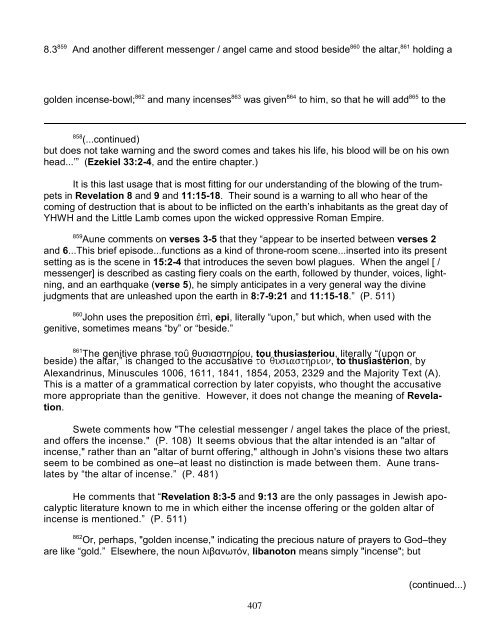859 860 8618.3 And another different messenger / angel came and stood beside the altar, holding a862 863 864 865golden incense-bowl; and many incenses was given to him, so that he will add to the858(...continued)but does not take warning and the sword comes and takes his life, his blood will be on his ownhead...’” (Ezekiel 33:2-4, and the entire chapter.)It is this last usage that is most fitting for our understanding of the blowing of the trumpetsin <strong>Revelation</strong> 8 and 9 and 11:15-18. Their sound is a warning to all who hear of thecoming of destruction that is about to be inflicted on the earth’s inhabitants as the great day ofYHWH and the Little Lamb comes upon the wicked oppressive Roman Empire.859Aune comments on verses 3-5 that they “appear to be inserted between verses 2and 6...This brief episode...functions as a kind of throne-room scene...inserted into its presentsetting as is the scene in 15:2-4 that introduces the seven bowl plagues. When the angel [ /messenger] is described as casting fiery coals on the earth, followed by thunder, voices, lightning,and an earthquake (verse 5), he simply anticipates in a very general way the divinejudgments that are unleashed upon the earth in 8:7-9:21 and 11:15-18.” (P. 511)860John uses the preposition ð, epi, literally “upon,” but which, when used with thegenitive, sometimes means “by” or “beside.”861The genitive phrase ôï èõóéáóôçñßïõ, tou thusiasteriou, literally “(upon orbeside) the altar,” is changed to the accusative to. qusiasth,rion, to thusiasterion, byAlexandrinus, Minuscules 1006, 1611, 1841, 1854, 2053, 2329 and the Majority Text (A).This is a matter of a grammatical correction by later copyists, who thought the accusativemore appropriate than the genitive. However, it does not change the meaning of <strong>Revelation</strong>.Swete comments how "The celestial messenger / angel takes the place of the priest,and offers the incense." (P. 108) It seems obvious that the altar intended is an "altar ofincense," rather than an "altar of burnt offering," although in John's visions these two altarsseem to be combined as one–at least no distinction is made between them. Aune translatesby “the altar of incense.” (P. 481)He comments that “<strong>Revelation</strong> 8:3-5 and 9:13 are the only passages in Jewish apocalypticliterature known to me in which either the incense offering or the golden altar ofincense is mentioned.” (P. 511)862Or, perhaps, "golden incense," indicating the precious nature of prayers to God–theyare like “gold.” Elsewhere, the noun ëéâáíùôüí, libanoton means simply "incense"; but407(continued...)
866 867 868prayers of all the set-apart-people, upon the golden altar--the one in the presence of the862(...continued)because of the adjective “golden” used to modify it here, it is assumed that an unusualmeaning has been given to the word by John, golden "incense-bowl," or golden "censer."863Aune translate by “a large quantity of incense” (p. 481).864Even though the subject of the verb is a plural noun, qumia,mata polla, thumiamatardpolla, “many incenses,” the verb is 3 person singular, aorist passive, evdo,qh, edothe, “wasgiven.”865The future verb äþóåé, dosei, literally “he will give,” is read by Sinaiticus, Alexandrinus,Ephraemi Rescriptus, Minuscule 1611, and some other Greek manuscripts. It is changedto the aorist subjunctive dw,sh, dose, “he might give,” by the Majority Text. It is changed to thepresent subjunctive dw|/, do, “he may be giving,” by Minuscules 1006, 1841, 2053 and a fewother Greek manuscripts. The variant readings do not change the meaning of <strong>Revelation</strong>, butare examples of later copyists enhancing the original text by improving on its grammar–a subjunctiveverb is more appropriate than the future–but this very fact indicates the originality ofthe future verb.Aune translates by “to offer as a complement to...” (P. 481)866The dative plural phrase ôáò ðñïóåõ÷áò, tais proseuchais, “to the prayers,” ischanged to an accusative phrase ta.j proseuca,j, tas proseuchas, “the prayers” (as directobject of the verb), by Minuscule 94, the Majority Text (A), the Old Latin manuscript gig andTyconius (who died after 390 A.D.). It is changed to the genitive plural tw/n proseucw/n, tonproseuchon, perhaps “with the prayers,” by Minuscule 1611. The variant cases reflect varyingunderstandings of the meaning of <strong>Revelation</strong>–i.e., was the incense added “to the prayers,”or were the prayers themselves given, or was the incense given along with the prayers? Thevariant readings do not change the meaning of <strong>Revelation</strong>, but show varying ways in which itcan be understood.867Not just the prayers of the martyrs who have died in their courageous witness (see<strong>Revelation</strong> 6:9-11), but the prayers of all God's people (this is Aune’s translation, p. 481), Hisearthly "kingdom of priests," ascend to heaven's throne. Aune comments that “If the coals offire from the heavenly altar symbolize the series of judgments that are about to be inflicted onthe people of the earth, then the prayers of the saints must be construed as prayers for divinevengeance upon those who have persecuted them, such as the prayer for vengeance utteredby the souls of the martyrs under the heavenly altar.” (Pp. 494-95)The poet has said, "More things are wrought through prayer than this world dreams of."John says the same thing in the highly symbolic language of his vision. The prayers of allGod's people are heard in heaven; and there, those prayers are taken seriously; "goldenincense" is added to them--they are increased and multiplied, and brought before the throne ofthe universe, before God and the Little Lamb--and they play an important role in the future ofthe universe!(continued...)408
















